Getting Ready for Chicks – Beginners Guide
Are you thinking about raising baby chicks? It’s a fun and rewarding experience, but it’s also a lot of work. Here’s everything you need to know to get started, from finding the right chicks to building their perfect home. Trust us, your little ones will be chirping in no time!
Disclosure: Some of the links below are affiliate links, meaning, at no additional cost to you, I will earn a commission if you click through and make a purchase.
Why you should raise baby chicks
Raising baby chicks can be a rewarding experience for everyone. Not only are they incredibly cute and give lots of entertainment, but caring for the chicks helps teach children the importance of responsibility. Watching your little chicks grow teaches children life skills such as patience and compassion; these lessons will serve them well throughout their life.
Also, raising baby chicks adds some extra interactivity to your backyard! As they grow, you’ll have the opportunity to watch them explore and develop their own personalities. There’s nothing quite like seeing a flock of your chickens wandering around as they experience new things.
Finally, raising baby chicks is an efficient way to fertilize your garden or yard since chickens happily eat insects, weeds and leftover vegetables or fruit from the kitchen. That’s why so many people choose to raise some chickens – it has immense benefits!
Where to Get Baby Chicks
If you are only looking for hens (or female chickens), then your best best is to order them from a reputable hatchery such as Murray McMurray Hatchery. They offer “sexed” chicks (that means you can choose either females or males) and guarantee a 100% accuracy rate.
They have a wonderful selection of various breeds, let you mix and match, and only require a low minimum number of chicks purchased per order (often just three).
They will ship your chicks to you anywhere in the country; you just go to your local post office to pick them up when they arrive.
Another option is your local feed store! Depending on the variety, you could get chicks separated by sex and breed or in one “straight run” tub with both males and females.
However, if roosters are not what you have in mind make sure to pick something else – no surprises here!
For a true budget option, you can take your chances at Craig’s List or a local farm to find baby chicks. With no guarantees of breed and sex, this is an easy way to get some new feathered friends on the cheap – just make sure they’ll be great egg layers in the end!
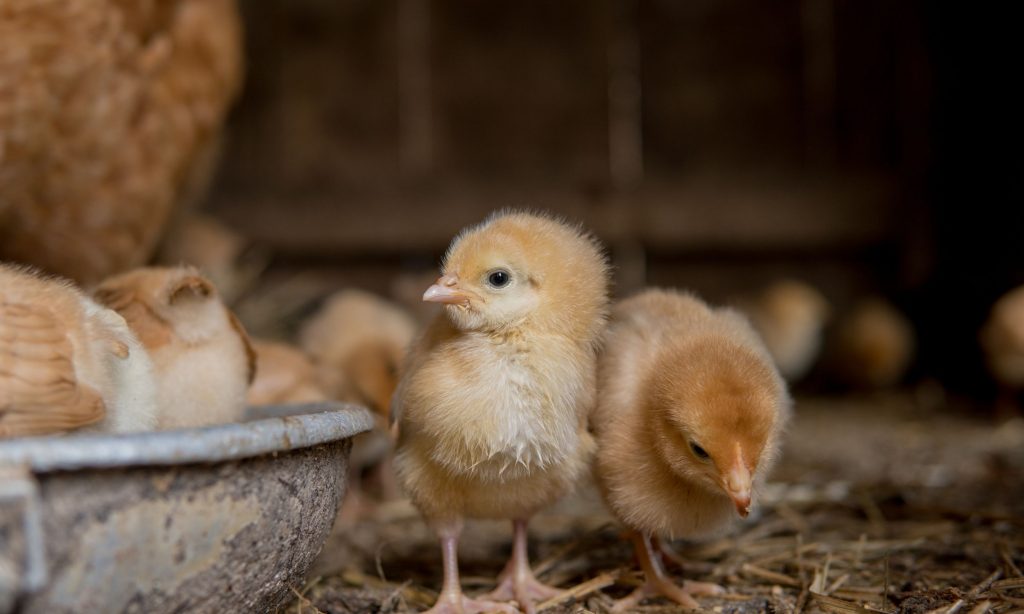
Supplies for Baby Chicks
Before you bring your chicks home, you will want to assemble some supplies for them. All of these items can be found at your local feed store, or online from Amazon.com.
- Brooder box (tote, playpen, cardboard box, etc.
- Newspaper
- Pine shavings
- Heat lamp
- Red bulb (plus white bulb or replacement bulb)
- Chick starter feed
- Chick-sized feeder
- Chick-sized waterer
- Small stones
- Chick grit (or plastic container of dirt)
- Electrolytes or plain Pedialyte
- Small thermometer
- Coop or Chicken “tractor”
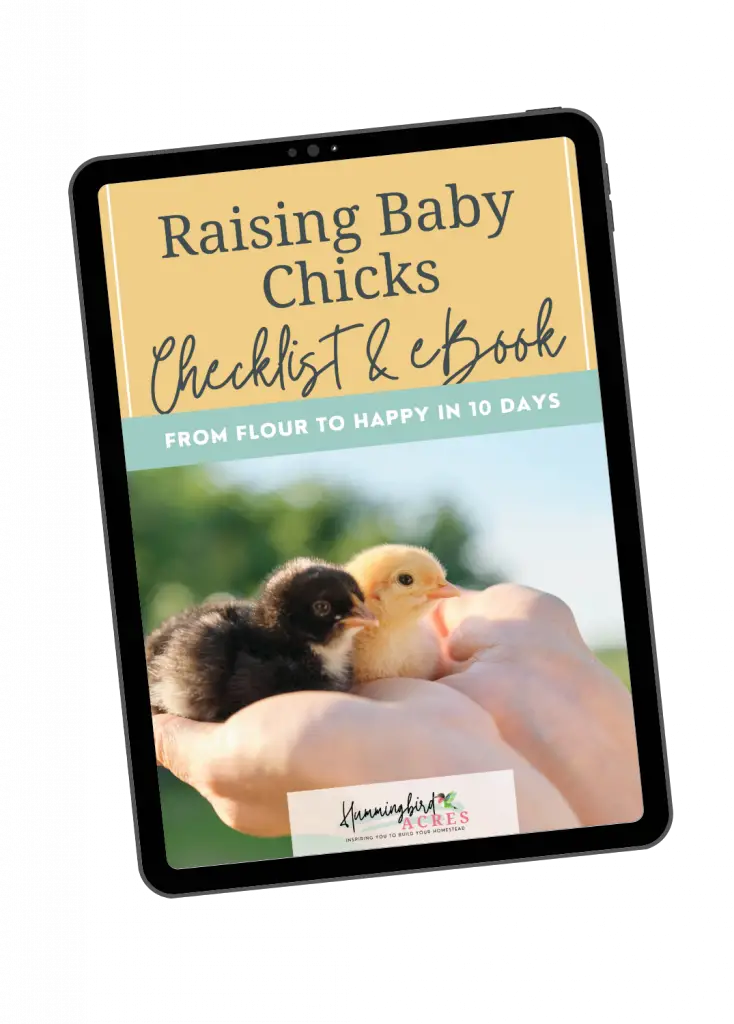
Thinking Chickens?
Get our FREE Raising Baby Chicks Checklist!
[convertkit form=4855906]
The Brooder
Whether you’re looking for something fancy or a DIY solution, providing your little chicks with the right home can make all the difference. Turning them into a large coop too soon is risky – it’s easy for baby birds to get lost in nooks and crannies during cold weather spells! Consider investing in (or making) an appropriate brooder as cozy shelter ensures they’ll remain snugly safe until ready to move on up.
Galvanized water tubs make great temporary homes; being tall enough that they can’t fly out and without corners for them get stuck in during chilly weather. Some alternatives could be plastic tubs, crates, cardboard boxes or even old playpens!
After deciding on the perfect brooder for your little ones, you want to make sure it’s comfy and secure. Soft pine shavings are great for keeping baby birds warm and cozy – or puppy pads if that’s what floats their boat!
Cleaning is a must though – every couple of days so you can remove any wet spots or heavily pooped areas before they get out of control.
When bringing home a batch of new chicks, you’ll want to be prepared for the worst – and that includes potential predators. So make sure to cover your brooder with chicken wire or mesh; just remember not to block ventilation.
Your brooder can be on the small side at first, but keep in mind they won’t stay little forever! These tykes tend to grow faster than anticipated.
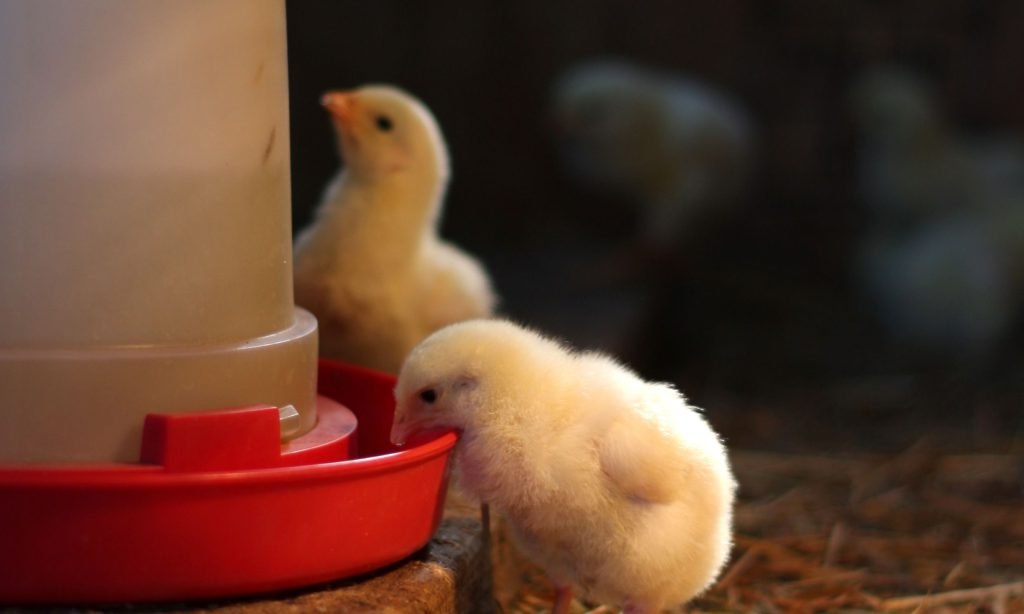
Heat
Keeping my chickens warm is an absolute must, especially when they’re just little babies. For the first week or so of their lives, I need to ensure that temperatures stay at a steady 95-100 degrees – no lower! Of course this comes with some danger; heat lamps may be necessary for optimal warmth but are quite risky due to potential fire hazards. In any case, keeping them cozy and safe is top priority!
If you’re looking for a traditional way to keep your baby chicks warm, the heat lamp could be an option – but make sure it’s used with extreme caution. A cardboard box isn’t suitable as a brooder when using this approach; safety first!
Are you worried about your coop catching fire? Invest in a heating plate – it may be costly, especially for larger flocks of chicks, but the peace-of-mind is invaluable!
To ensure the perfect temperature in their brooder, savvy chick-keepers know to listen and observe instead of relying on a thermometer. If they’re huddled towards the heat lamp for warmth or trying to escape its rays due to discomfort, this presents an obvious indication that adjustments may need made – like adding another set of plates for chillier chicks looking for relief!
Water
When I bring home a box of new chicks, the first thing to do is get them familiar with their essential lifeline: water! Gently dipping their beaks into the waterer shows these little ones that it’s there and ready for use.
I highly recommend using a special chick waterer of some sort, as an open bowl leaves your new flock at risk for drowning.
Make sure the chicks water stays somewhat warm and full at all times.
Feed
With new chicks having very specific nutritional needs during their quick growth spurts, purchasing chick starter feed from the local store is often the easiest and most convenient option. And don’t worry – they won’t stay on it for long! Before you know it your tiny creatures will be ready to transition to either meat bird or layer feed.
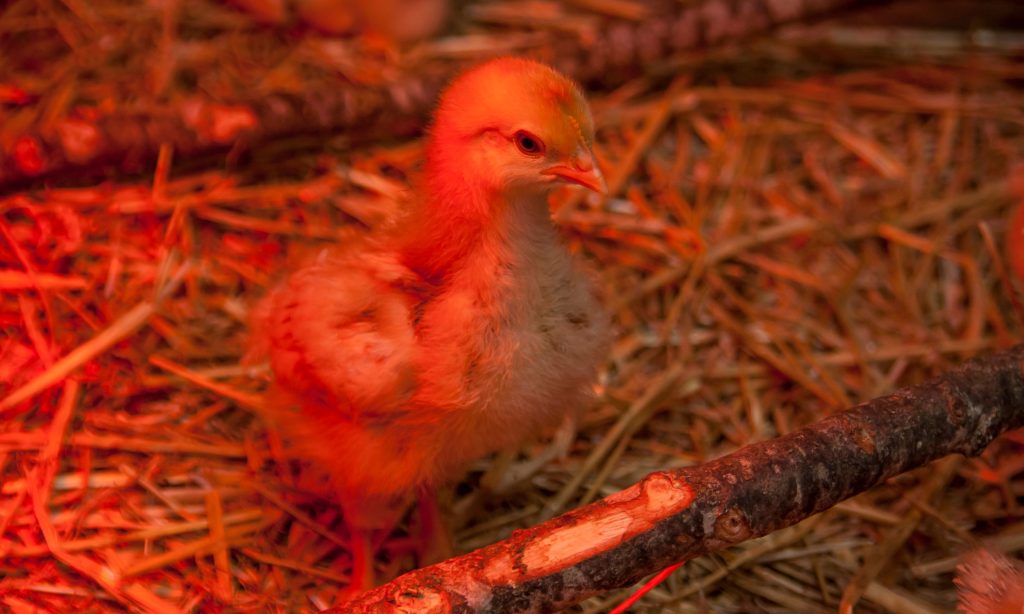
New Chick FAQ
How often should I check on my chicks?
It is important to check on your baby chicks often, as they grow quickly and can experience health problems in their early stages. Baby chicks should be monitored regularly to ensure their development is healthy – experts recommend checking on them at least a few times a day.
It’s also important to check if the young birds have enough food and water, as well as secure shelter that is free from predators. Checking for signs of illness or injury should also be part of your routine when caring for baby chicks. To make sure your chicks are in good health and growing properly, give them plenty of attention every day!
What about electrolytes?
It depends on who you talk to… Some folks recommend electrolytes in the water for all new chicks, while others say only use as needed. I’ve only ever used electrolytes for stressed or injured chicks– never for the whole flock. However, if your new batch of chicks are particularly stressed or seem to not be thriving as they should, I would recommend adding a chicken electrolyte solution to their water. You can grab these at your feed store or from the hatchery, or make your own.
Homemade Electrolyte Recipe for Chicks
- 1 cup warm water
- 2 teaspoons molasses OR 2 teaspoons granulated sugar
- 1/8 teaspoon salt
- 1/8 teaspoon baking soda
- 1/8 teaspoon potassium chloride (optional)
Mix all the ingredients together and stir until completely combined.
When can they start going outside?
When it comes to taking newborn baby chicks outside, patience is key. Baby chicks should stay in the brooder until they are around 8 weeks old and develop their feathers.
During this time, make sure to give them a balanced diet and have plenty of logistic considerations like proper temperature, humidity and control over the environment’s light cycle, so that the chicks can thrive. Since baby chicks are very vulnerable during these first few weeks, be careful not to expose them too early or too late.
Choosing the correct temperature during warmer months can also substantially affect when you can safely take your baby chicks out for the first time – opt for temperatures no greater than 70F and make sure your place of choice has plenty of protection from strong winds or heavy rain. Taking all these things into account, you will surely be giving your baby chicks the best start they could get!
How do I know if they’re sick?
Navigating chick health can be tricky. Luckily, there are a few telltale signs that your chicks may be under the weather. First, watch out for any unusual behaviors like increased lethargy or decreased appetite.
Second, check to see if they’re sneezing or coughing; this is usually an indication of respiratory issues.
Third, pay attention to their droppings; watery and unformed poops can be a sign of infection such as coccidiosis.
Lastly, any changes in their feathers could point to mites or bacterial infections.
Taking note of these potential red flags can help you spot sick chickens early and ensure they get the proper care and treatment that they need.
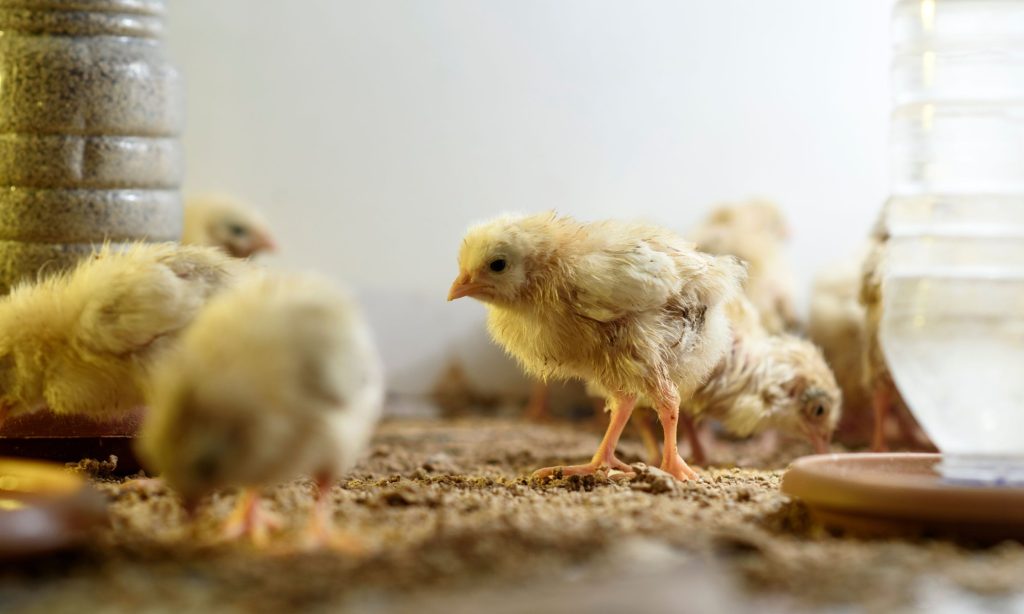
You may also enjoy these related articles:
Did you enjoy this article? Want to hear more? Stay in touch! Sign up below to receive weekly tips and inspiration for your homestead.
[convertkit form=3733554]

